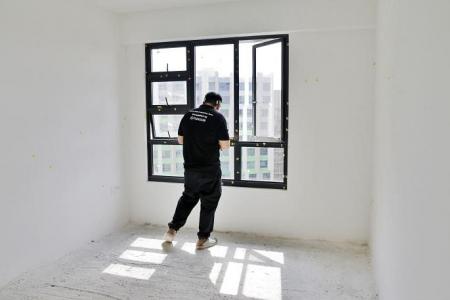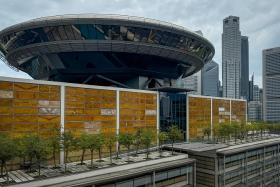Home defect spotters call for regulation as demand increases
Having collected the keys to their Bukit Timah condominium in March, Mr Jonathan Lim and his wife looked for a defect inspector to check the fittings in their new home.
An inspection usually costs $300 to $1,000, depending on the size of the property, but “we were quite cost-conscious so my wife had found a firm advertising defect inspection services on Carousell for around $100”, said Mr Lim, 39. The decision did not pay off.
Mr Lim, who works in finance, said: “The inspector turned out to be quite unprofessional and would change the appointment several times at the last minute.”
When the inspection eventually took place, Mr Lim said the inspector did not uncover or identify defects that he and his wife could see for themselves. “Some of our marble tiles were cracked and the wardrobe doors did not close properly, but the inspector missed these defects.”
Mr Lim said he was recommended another defect inspection firm by a neighbour after sharing his negative experience.
Engaging the second inspector took a month, and Mr Lim and his wife moved in only on July 7 after rectification works were completed.
“If we had gone with a proper firm from the start, the process would have been much smoother and we would have been able to move in earlier,” he said.
What makes for a “proper” defect inspector may need to be regulated as demand for such services from home owners of Build-To-Order flats, condominium units and landed houses increases, according to those in the industry.
Mr Tan Wee Kwang, director of defect inspection firm Absolute Inspection, told The Straits Times: “To our knowledge, there is no local accreditation, licensing or regulations on home defect inspectors. This means that any man on the street can set up shop and offer paid defect inspection services to unsuspecting home owners.”
Another inspector, Mr Muhd Ismail, who runs SG Defects Scan, said: “When the inspection is conducted by someone who is untrained, both the contractor and home owner are affected. The contractor might waste resources or the home owner might have his move-in date delayed.”
In response to queries, a spokesman for the Building and Construction Authority (BCA) said the agency does not regulate commercial defect inspection companies.
“We understand that some home owners may wish to engage defect inspectors for various reasons. As with other consumer services, home owners should exercise due diligence before engaging firms,” said the spokesman.
Mr Jay Ng from Uncle Defect said that regulations could require inspectors and firms to register with the BCA, or ensure they underwent training. He added that while this might increase the cost for the customer, the measures would deter individuals who are not equipped to do the job.
“We have worked on projects where the interior designer or property agent claimed an inspection had been carried out. But because the home owners later realised that the inspection was not done properly, they proceeded to engage our services,” said Mr Ng.
Mr Tan said that untrained individuals may not know what to check or which inspection tools to use, or how to use these properly.
“They also may not possess the correct knowledge and information on the various building systems and fittings they are checking, often reporting ‘defects’ that are not legitimate,” he added.
A spokesman for the Consumers Association of Singapore said that the association has not received any complaints regarding defect inspection firms over the past year.
Mr Ismail said that to prevent any conflict of interest, defect inspection firms should deal only with the client that has engaged them.
“I only liaise directly with my client, who are usually home owners. Interior designers and contractors rarely engage our services as they may be reluctant to acknowledge the defects found.
“Home owners should also only engage inspection companies that are not providing other services, such as renovation. This is so that the firm does not unnecessarily identify defects in the hope that it can also be engaged to carry out the rectifications.”
Get The New Paper on your phone with the free TNP app. Download from the Apple App Store or Google Play Store now


